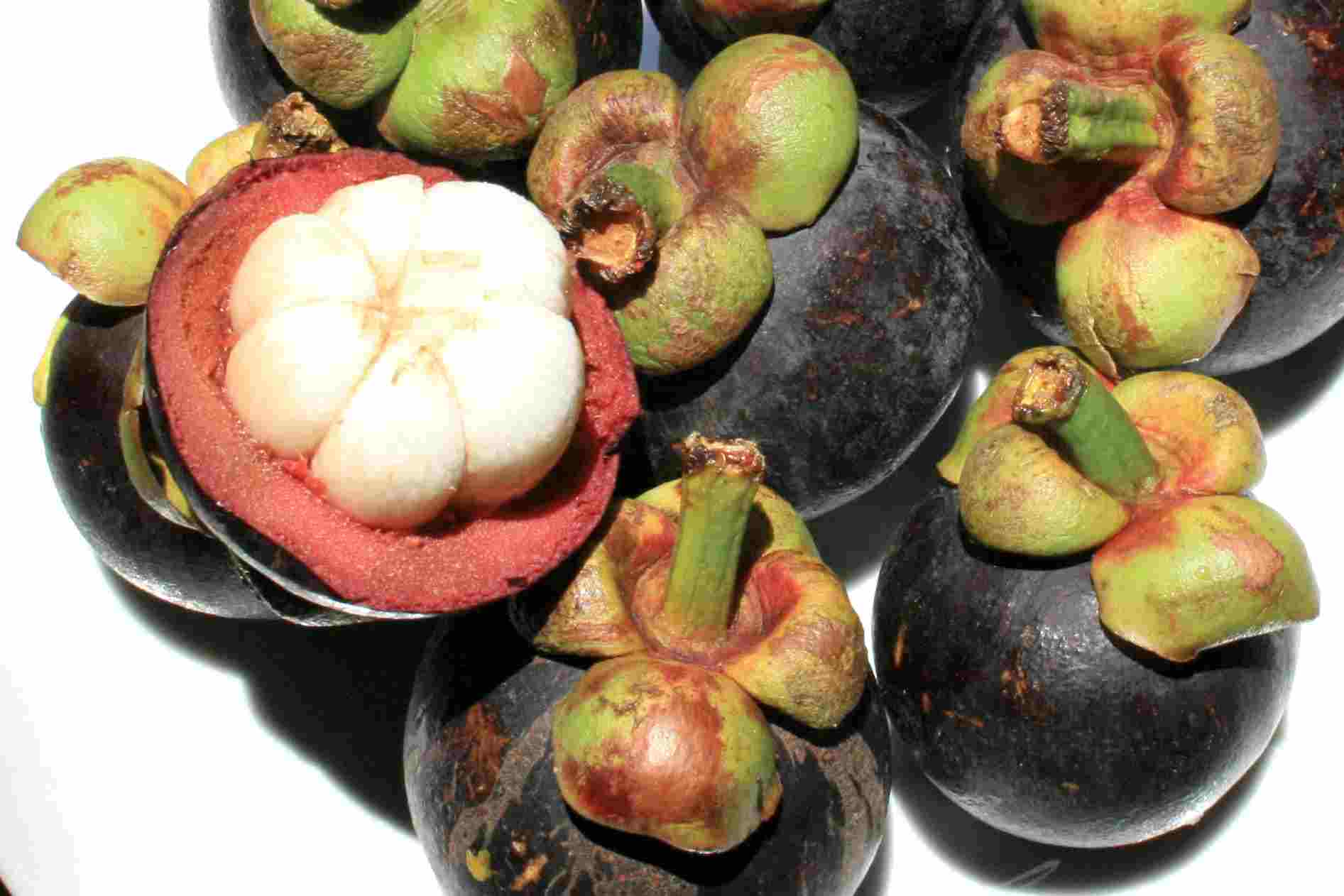
The rind (exocarp) of the edible mangosteen fruit is deep reddish purple when ripe. Botanically an aril, the fragrant edible flesh can be described as sweet and tangy, citrusy with peach flavor and texture. Although the specific history of mangosteen is not known, legend says that Queen Victoria offered a reward to anyone who could deliver to her the fabled fruit. In addition, in his publication, "Hortus Veitchii," James Herbert Veitch says that he visited Java in 1892, "to eat the Mangosteen. It is necessary to eat the Mangosteen grown within three or four degrees of latitude of the equator to realize at all the attractive and curious properties of this fruit."
Mangosteen (Garcinia mangostana) is a tropical fruit that originates from Southeast Asia. It is known as the “queen of fruits” and has many health benefits. The mangosteen fruit is the size of a small apple, with a thick, dark purple-red rind and a white, juicy, edible interior. This fruit has a sweet, tangy, and slightly astringent taste that is enjoyed by many people.
Mangosteen has been used for centuries in traditional medicine for its anti-inflammatory, antioxidant, and antimicrobial properties. The mangosteen fruit contains several bioactive compounds, including xanthones, flavonoids, and tannins. These compounds are responsible for most of the health benefits associated with mangosteen.
One of the most significant benefits of mangosteen is its antioxidant properties. Antioxidants are molecules that can neutralize harmful free radicals in the body, which can cause damage to cells and contribute to chronic diseases such as cancer, heart disease, and Alzheimer’s disease. Mangosteen is a rich source of antioxidants, including xanthones, which can help protect the body against oxidative stress and inflammation.
Mangosteen also has anti-inflammatory properties, which can help reduce swelling, redness, and pain in the body. Inflammation is a natural response to injury or infection, but if it becomes chronic, it can lead to a range of health problems. Mangosteen’s anti-inflammatory properties may make it beneficial for people with arthritis and other conditions characterized by chronic inflammation.
Mangosteen has also been shown to have antimicrobial properties, which can help fight off harmful bacteria, viruses, and fungi. This may make mangosteen an effective natural remedy for infections such as candida overgrowth, skin infections, and respiratory infections.
In addition to these health benefits, mangosteen has also been shown to have potential weight loss benefits. One study found that mangosteen extract can reduce body weight, body fat, and waist circumference in obese adults. The researchers suggested that mangosteen may help reduce the absorption of dietary fat and increase the body’s ability to burn fat.
Another study found that mangosteen extract can improve insulin sensitivity and glucose metabolism in people with type 2 diabetes. This may be due to the presence of xanthones, which have been shown to improve glucose uptake in cells.
Mangosteen has also been found to have anti-cancer properties. Several studies have shown that mangosteen extract can inhibit the growth and spread of cancer cells in test tubes and animal models. The xanthones in mangosteen have been found to induce apoptosis (programmed cell death) in cancer cells, as well as inhibit angiogenesis (the formation of new blood vessels that cancer cells need to grow and spread).
Despite the many health benefits of mangosteen, it is important to note that more research is needed to fully understand its effects on human health. Mangosteen should not be used as a substitute for conventional medical treatment and should be used with caution, especially in high doses.
Mangosteen is a versatile fruit that can be eaten on its own as a snack or added to salads, smoothies, and other dishes. It is also available in supplement form, such as mangosteen extract pills and powders. When purchasing mangosteen supplements, it is important to choose products from reputable brands and consult with a healthcare provider before taking them, especially if you are taking medication or have a medical condition.